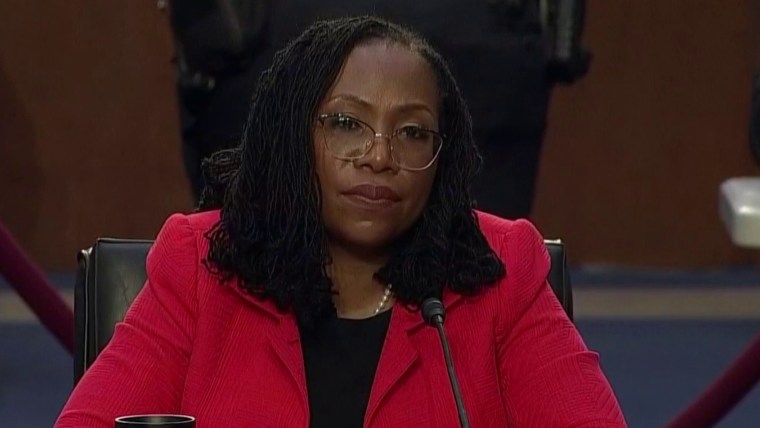Demagogic Dull Republcians are attacking Supreme Court nominee Katanji Brown Jackson. What will be the response of our two Republican Florida U.S. Senators, RICHARD LYNN SCOTT and MARCO ANTONIO RUBIO?
From MSNBC:
Why Josh Hawley's sensationalism was no match for Ketanji Brown Jackson

Although Republicans have raised the specter of Brett Kavanaugh’s and Amy Coney Barrett’s Supreme Court confirmation hearings multiple times this week, Ketanji Brown Jackson’s credentials should have made her confirmation hearings more like the proceedings for Neil Gorsuch. Republicans may not like having a Democratic nominee to consider, but her qualifications are impeccable and her demeanor — even in the face of Sen. Ted Cruz, R-Texas, pulling out his “Antiracist Baby” book — is laudable.
Instead of asking questions designed to clarify, Republicans have gone straight to the fringes.
Like Gorsuch, who drew letters of support from bipartisan groups of lawyers, Jackson’s support includes the Fraternal Order of Police and former Republican appointees to the federal bench, including an introduction from retired Judge Thomas Griffith, who served on the U.S. Court of Appeals for the District of Columbia Circuit. In another era, Jackson’s nomination would have hardly been contentious at all. In 1986, former Justice Antonin Scalia’s confirmation vote was 98-0; former Justice Ruth Bader Ginsburg’s 1993 vote was 96-3.
Yet Jackson most likely faces a confirmation vote along close to party lines: She picked up just three Republican votes during her confirmation to the Court of Appeals last year, a reflection of the times we live in and not of her credentials. Her 2022 confirmation hearings seem to have taken on the patina of a Festivus airing of grievances.
Kavanaugh, many will remember, emotionally and at times rudely defended himself against an allegation of a drunken teenage sexual assault. He insolently asked Minnesota Sen. Amy Klobuchar if she had a drinking problem as she questioned him. This type of retort was, obviously, out of the question for Jackson, the first Black woman nominated to sit on the Supreme Court.
Republican senators complained they didn’t know what her judicial philosophy was, as if her 570-plus judicial opinions were not enough to put it on full display. But instead of asking questions designed to clarify, Republicans have gone straight to the fringes.
Sen. Marsha Blackburn, R-Tenn., literally asked her to define “woman.”Sen. Lindsey Graham, R-S.C., asked about her faith, which is explicitly not a relevant consideration for a position on the court. Sen. Tom Cotton, R-Ark., asked questions about criminal justice policy decisions that aren’t in the Supreme Court’s wheelhouse, like whether Jackson thought more people who commit murder should be arrested.
The most disingenuous line of questioning came from Sen. Josh Hawley, R-Mo., a Yale-educated lawyer, who seemed determined to fault Jackson for what he deemed unfairly low sentences in child pornography cases. Hawley refused to consider that her sentences were imposed pursuant to laws written by Congress. Jackson calmly pointed out that once-mandatory sentencing guidelines became advisory after U.S. v. Booker, a 2005 Supreme Court decision, directed judges to consider them as just one factor among others set by statute. Hawley maintained her sentences were not long enough. When Jackson gently reminded him her sentences were consistent with those imposed by other judges, Hawley ultimate responded that what Congress really wanted was the restoration of mandatory guidelines.
Jackson noted what an educated lawyer like Hawley should already know: Judges impose sentences based on the laws Congress passes.
Hawley pressed forward, using sensational facts from a child pornography possession sentencing to imply Jackson was too lenient toward defendants who abused children. With what must have been rapidly decreasing patience (although she retained her composure), Jackson noted what an educated lawyer like Hawley should already know: Judges impose sentences based on the laws Congress passes. Judges must consider each case individually at sentencing, must consider all of the facts in the record and must apply the law to them for that specific defendant. In fact, decisions by judges who don’t address all of the factors Congress set forth in sentencing laws can be reversed on appeal.
Perhaps Hawley’s cherry-picked arguments succeeded with some people. Certainly Fox News loved it. And other senators picked up his line of questioning throughout Tuesday and into Wednesday.
As a federal prosecutor in North Alabama, I handled a number of cases like the possession of child pornography cases Hawley discussed. Although the conduct may not be as destructive as cases where defendants abuse children to create pornography or distribute it, they are still, as Jackson said, heinous, serious cases. As a prosecutor, I wanted to get the longest sentence possible in every one of them. But the law, passed by Congress, requires a judge to “impose a sentence sufficient, but not greater than necessary,” to punish the crime, protect the community and rehabilitate the offender.
Many judges share Jackson’s concern that sentencing guidelines set the peg higher than the appropriate sentence when a judge considers the factors set out in the law, including the offender’s age and background and the circumstances of the offense. Child pornography crimes and sentencing guidelines have not been updated to reflect the easy availability of videos and pictures on the internet. Ultimately, Congress writes the laws that govern these matters and provide both prosecutors and judges with the rules of the road.
As Jackson implied, that means Congress — including Hawley — has control over the legal environment in which judges hand down sentences. Sen. Dick Durbin, D-Ill., chair of the Senate Judiciary Committee, made that point more explicit, admonishing Hawley for blaming Jackson when he should be admonishing Congress’ failure to act. Even the right-wing National Review clarified that far from being soft on crime, Jackson is in the “mainstream.”
The exchange with Hawley came somewhere around hour nine of Tuesday’s hearings. It was exhausting to watch, let alone to participate in. Yet, Jackson did not resort to hysterics or defensive comebacks. If anything, the persistently dense questioning spotlighted her patience, her ability to answer confusing questions in a straightforward manner and her willingness to engage on difficult issues.
But it was still later in the hearing, during questioning by Cotton, that she gave an answer that revealed the transparently political nature of the proceedings. The senator repeatedly suggested Jackson was avoiding his policy questions on crime prevention and law enforcement. “It's not that they're difficult questions,” she finally replied. “It's that they're not questions for me. I am not the Congress."
Throughout the hearings so far, Jackson has responded with a seriousness and dignity to questions that didn’t always merit that level of consideration. She has displayed, as promised by her résumé and the president who nominated her, a quick wit, a broad knowledge of the Constitution and an eagerness to fulfill her constitutional role without exceeding it.
She explained complicated legal doctrines like the Fourth Amendment’s protection from unlawful search and seizure and the Fifth Amendment right to counsel in a manner that was thoroughly accessible to nonlawyers yet sophisticated and complete. And she clearly loves the law. Her face lit up during an exchange with Sen. Richard Blumenthal, D-Conn., a former prosecutor, about her commitment to serving on the court in a manner that permits people to have confidence in it. This former public defender, sentencing law expert and respected jurist is committed to stepping into the shoes of her retiring mentor Justice Stephen Breyer and finding new ways to bring consensus to the court.
It is not going to be an easy job. But Jackson looks fully prepared to take it on.
CORRECTION (March 23, 2022, 8:21 p.m. ET): A previous version of this article misspelled the first name of a Supreme Court justice. He is Neil Gorsuch, not Neal.
Joyce White Vance is an MSNBC columnist and NBC News and MSNBC legal analyst. She is a law professor at the University of Alabama School of Law and a former U.S. attorney in the Northern District of Alabama.



No comments:
Post a Comment